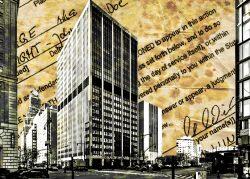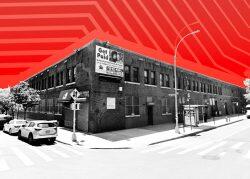Abraham Leser’s firm fell behind on debt payments at 111 Livingston Street after two tenants, Brooklyn Law School and the Legal Aid Society, went on rent strike and sued Leser over delayed maintenance at the Downtown Brooklyn office building.
Court records indicate that months of back rent accumulated, possibly hindering the Leser Group’s ability to service its debt.
Leser became delinquent on the property’s $120 million loan in May, then missed June’s payment, Morningstar data shows.
As of July, Morningstar marked the loan current but the debt remains watchlisted. Louis Solomon of Reed Smith, which is representing Leser in the lawsuit, confirmed that the loan is performing.
“The normal operations between the bank and the company are fully in place,” Solomon wrote in an email.
The building’s occupancy rate dropped to just 55 percent in December and Leser hasn’t provided required financial updates on the building since early 2022. The loan is due in three years.
Meanwhile, the Legal Aid Society and Brooklyn Law School, which together lease over a third of the building’s rentable area, have withheld rent, citing delayed maintenance at the property.
Each has sued to terminate its lease and Leser is opposing those efforts, court records show.
Brooklyn Law, which leases two floors, filed suit in May 2021 citing open safety violations tied to the building’s elevators and a faulty HVAC system resulting in air quality “so poor that the Law School is impaired from using the premises as intended.”
The problems spurred a raging mold infestation in the building, driving Legal Aid, which rents six floors, to serve Leser with a notice to terminate its lease in June 2022, according to a court filing by the nonprofit.
As of February, the Legal Aid Society had racked up $7.2 million in unpaid rent and utility bills, Leser’s legal filings allege. In April, Leser sued to evict Brooklyn Law School for $1.6 million in arrears.
Solomon said the matter with Legal Aid had been resolved in a consensual out-of-court settlement, the terms of which are anonymous. The case is listed as active in online records.
“I cannot speak for the courts,” Solomon said in an email.
Legal Aid’s attorney on the case did not respond to a request for comment.
Brooklyn Law’s arrears are still growing. Candace Carponter, who represents Leser in the nonpayment suit, said.
“Nothing has been paid since [April] and the math is pretty simple,” she wrote in an email. As of July, the firm owes upwards of $2 million in back rent, unpaid electric bills, taxes and a fire alarm charge, court records indicate.
Carponter said Brooklyn Law School had filed to stay the eviction suit in state Supreme Court and the motion is scheduled to be argued August 1.
So long as either firm holds a lease, Leser will be unable to re-rent the space and boost revenue.
Leser last reported monthly net cash flow of $2 million in January 2022, a 78 percent drop from five years earlier, when the investor took out the loan. It’s likely revenue has fallen further, given the rent strike.
The New York office market’s value will drop about 44 percent by 2029, an updated report by New York University and Columbia found.
If those projections hold true, it will be difficult for office landlords such as Leser to cover debt service and refinance when their loans come due.
Abrams Fensterman, the firm representing Brooklyn Law School in its suit against Leser, declined to comment.
Brooklyn Law has not yet obtained representation in the nonpayment suit brought by Leser Group, according to court records.
Read more



